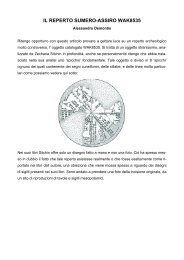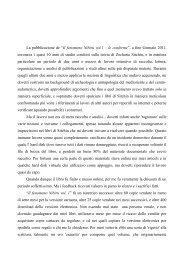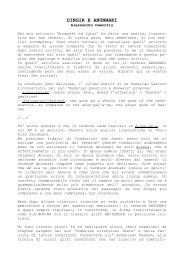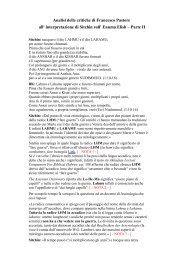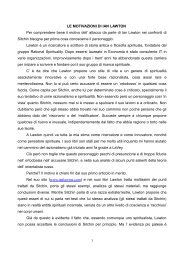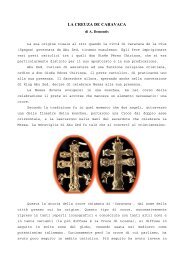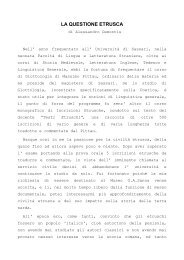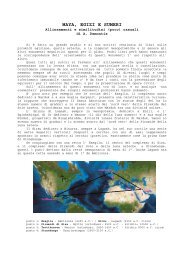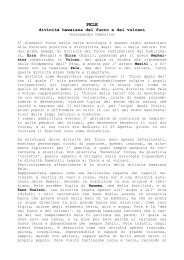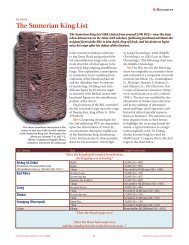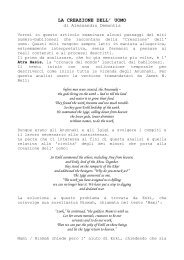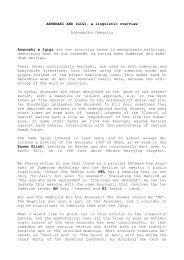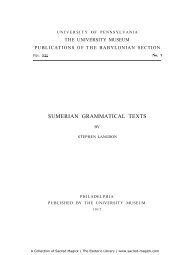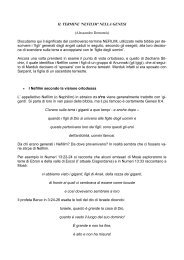Elementary Sumerian Glossary
Elementary Sumerian Glossary
Elementary Sumerian Glossary
Create successful ePaper yourself
Turn your PDF publications into a flip-book with our unique Google optimized e-Paper software.
KÁ.GAL → abul<br />
ka5-a (some now read ka5 a ) fox<br />
káb - du11 to measure ( with a container); to verify,<br />
test, check (Attinger, Eléments 572-576; Civil,<br />
Farmer's Instructions p. 153-163; cf. latāku)<br />
káb-du11-ga (a kind of jar) (Civil, Farmer's<br />
Instructions p. 160-162); "geeichtes Gefäß"<br />
(Sallaberger, Töpfer p. 102)<br />
kadra(NÌ.ŠÀ.A), kádra(NÌ.ŠÀ) present (to a<br />
superior), offering (cf. Attinger, ZA 87, 115, reading<br />
kádra a )<br />
kak → gag<br />
KAL → , sig15, sun7<br />
kal to be precious, dear, valuable<br />
kal(-la) precious; kal-kal(-la) very precious<br />
kala(g) (kalag), kal-la(-g) to be strong, mighty; to<br />
strengthen, mend<br />
kal-ga (or kalag-ga) strong, mighty; hard (/kalag+a/<br />
> /kalga/ like /uzud+a/ > /uzda/)<br />
kalam country, nation (normally referring to Sumer,<br />
see Jacobsen, AfO 26, 9)<br />
kankal(KI.KAL) bare, fallow ground<br />
kar quay, wharf; market<br />
kar to flee, escape; to take away, remove, strip off; to<br />
steal<br />
kar-KID, (OS kar-kid3) conventionally "prostitute,"<br />
but now understood as a class of women not living<br />
under male authority, an independent woman (harimtu)<br />
(Assante, UF 30, 5-97; cf. Glassner, RAI 47, 151ff.)<br />
kár to be bright, shining; to light up, flare up; to<br />
provoke, incite (cf. nu-kár-kár-dè without<br />
provocation) Wr. GANA2 (non-tenû) in OS.<br />
kara6(GURU7) granary, grain store, grain heap (for<br />
reading see Marchesi, LUMMA 111 + n. 569)<br />
karadin → garadin<br />
kaskal road, highway; caravan, expedition<br />
KASKAL mušen → ir7 mušen<br />
kaš, kas beer<br />
kaš-dé-a feast, banquet<br />
kaš4/kas4 - du11 to run; to hasten (Attinger, Eléments<br />
578-586)<br />
kéš(d/r) to be bound, tied, joined; to be locked, closed,<br />
blocked, stopped, sealed. The root has a /d/ or /r/<br />
Auslaut, and the full finite root may be kešedr; cf.<br />
OBGT 12, 5: saĝ kéš-šè-ra-ab = kişşar "bind!" and see<br />
Steinkeller, JNES 46, 57. The past participle is written<br />
kéš-da (kešda da ) or kešda(KÉŠ). Cf.<br />
giš kirid(KEŠDA) hair clasp<br />
ki place; ground, earth; (a term for the netherworld);<br />
place where (as relative pronoun); used before a GN to<br />
designate a state, e.g. ki Lagaš ki "the state of Lagaš";<br />
used to express spatial ideas with PN's or pronouns,<br />
e.g. ki PN-ak-šè "to PN's location > to PN," ki-bi-ta<br />
"from there," ki-ba "here"<br />
KI.A → ki-duru5, peš10<br />
ki-a-naĝ place of (funerary) libations<br />
ki(g) - áĝ to love (for /g/ Auslaut see Sefati, AV Artzi<br />
57 n. 53, Love Songs 355; Sollberger, TCS 1, 141)<br />
ki-ba - ĝar to replace, substitute, exchange<br />
ki-bala, ki-bal-a rebellious, rebel land<br />
ki-bé - gi4, ki-bi-šè - gi4 to return to its original state,<br />
restore<br />
ki-bíl-lá hot, scorched place; ki-bíl-bíl-lá hottest place<br />
ki-búr solution (to a riddle)<br />
ki - dar to break through the ground, emerge from the<br />
earth (cf. ki-in-dar crevice)<br />
ki-DÚR → ki-tuš<br />
30



